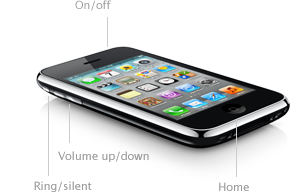 Size and Weight
Size and WeightHeight: 4.5 inches (115.5 mm)
Width: 2.4 inches (62.1 mm)
Depth: 0.48 inch (12.3mm)
Weight: 4.8 ounces (135 grams)
Color and Capacity
Black
8GB flash drive
Cellular and Wireless
UMTS/HSDPA (850, 1900, 2100 MHz) GSM/EDGE (850, 900, 1800, 1900 MHz)
802.11b/g Wi-Fi
Bluetooth 2.1 + EDR wireless technology
Location
Assisted GPS
Digital compass
Wi-Fi Cellular
Display
 3.5-inch (diagonal) widescreen Multi-Touch display
3.5-inch (diagonal) widescreen Multi-Touch display480-by-320-pixel resolution at 163 ppi
Fingerprint-resistant oleophobic coating
Support for display of multiple languages and characters simultaneously
Camera, Photos, and Video Video
recording, VGA up to 30 frames per second with audio
3-megapixel still camera
Autofocus
Tap to focus
Photo and video geotagging
External Buttons and Connectors
External Buttons and Controls
Connectors and Input/Output
Power and Battery
Built-in rechargeable lithium-ion battery
 Charging via USB to computer system or power adapter
Charging via USB to computer system or power adapterTalk time: Up to 5 hours on 3G, up to 12 hours on 2G
Standby time: Up to 300 hours
Internet use: Up to 5 hours on 3G, up to 9 hours on Wi-Fi
Video playback: Up to 10 hours
Audio playback: Up to 30 hours
Audio Playback
 Frequency response: 20Hz to 20,000Hz
Audio formats supported: AAC (8 to 320 Kbps), Protected AAC (from iTunes Store), HE-AAC, MP3 (8 to 320 Kbps), MP3 VBR, Audible (formats 2, 3, 4, Audible Enhanced Audio, AAX, and AAX+), Apple Lossless, AIFF, and WAV
Frequency response: 20Hz to 20,000Hz
Audio formats supported: AAC (8 to 320 Kbps), Protected AAC (from iTunes Store), HE-AAC, MP3 (8 to 320 Kbps), MP3 VBR, Audible (formats 2, 3, 4, Audible Enhanced Audio, AAX, and AAX+), Apple Lossless, AIFF, and WAVUser-configurable maximum volume limit
TV and Video
Video out support at 576p and 480p with Apple Component AV Cable; 576i and 480i with Apple Composite AV Cable (cables sold separately)
Video formats supported: H.264 video, up to 1.5 Mbps, 640 by 480 pixels, 30 frames per second, Low-Complexity version of the H.264 Baseline Profile with AAC-LC audio up to 160 Kbps, 48kHz, stereo audio in .m4v, .mp4, and .mov file formats; H.264 video, up to 2.5 Mbps, 640 by 480 pixels, 30 frames per second, Baseline Profile up to Level 3.0 with AAC-LC audio up to 160 Kbps per channel, 48kHz, stereo audio in .m4v, .mp4, and .mov file formats; MPEG-4 video, up to 2.5 Mbps, 640 by 480 pixels, 30 frames per second, Simple Profile with AAC-LC audio up to 160 Kbps, 48kHz, stereo audio in .m4v, .mp4, and .mov file formats
 Headphones
HeadphonesApple Earphones with Remote and Mic
Frequency response: 20Hz to 20,000Hz
Impedance: 32 ohms
Mail Attachment Support
Viewable Document Types .jpg, .tiff, .gif (images); .doc and .docx (Microsoft Word); .htm and .html (web pages); .key (Keynote); .numbers (Numbers); .pages (Pages); .pdf (Preview and Adobe Acrobat); .ppt and .pptx (Microsoft PowerPoint); .txt (text); .rtf (rich text format); .vcf (contact information); .xls and .xlsx (Microsoft Excel)
Sensors
Accelerometer
Proximity sensor
Ambient light sensor
System Requirements
Apple ID (required for some features)
Internet access4
Syncing with iTunes on a Mac or PC requires: Mac: OS X v10.5.8 or later PC: Windows 7; Windows Vista; or Windows XP Home or Professional with Service Pack 3 or later iTunes 10.5 or later (free download from www.itunes.com/download)
Environmental Requirements
Operating temperature: 32° to 95° F (0° to 35° C)
Nonoperating temperature: -4° to 113° F (-20° to 45° C)
Relative humidity: 5% to 95% noncondensing
Maximum operating altitude: 10,000 feet (3000 m)
Language
Support English (U.S.), English (UK), Chinese (Simplified), Chinese (Traditional), French, German, Italian, Japanese, Korean, Spanish, Arabic, Catalan, Croatian, Czech, Danish, Dutch, Finnish, Greek, Hebrew, Hungarian, Indonesian, Malay, Norwegian, Polish, Portuguese, Portuguese (Brazil), Romanian, Russian, Slovak, Swedish, Thai, Turkish, Ukrainian, Vietnamese Keyboard Support: English (U.S.), English (UK), Chinese - Simplified (Handwriting, Pinyin, Wubihua), Chinese - Traditional (Handwriting, Pinyin, Zhuyin, Cangjie, Wubihua), French, French (Canadian), French (Switzerland), German (Germany), German (Switzerland), Italian, Japanese (Romaji, Kana), Korean, Spanish, Arabic, Bulgarian, Catalan, Cherokee, Croatian, Czech , Danish, Dutch, Emoji, Estonian, Finnish, Flemish, Greek, Hawaiian, Hebrew, Hindi, Hungarian, Icelandic, Indonesian, Latvian, Lithuanian, Macedonian, Malay, Norwegian, Polish, Portuguese, Portuguese (Brazil), Romanian, Russian, Serbian (Cyrillic/Latin), Slovak, Swedish, Thai, Tibetan, Turkish, Ukrainian, Vietnamese Dictionary Support English (U.S.), English (UK), Chinese (Simplified), Chinese (Traditional), French, French (Canadian), French (Switzerland), German, Italian, Japanese (Romaji, Kana), Korean, Spanish, Arabic, Catalan, Cherokee, Croatian, Czech, Danish, Dutch, Estonian, Finnish, Flemish, Greek, Hawaiian, Hebrew, Hindi, Hungarian, Indonesian, Latvian, Lithuanian, Malay, Norwegian, Polish, Portuguese, Portuguese (Brazil), Romanian, Russian, Slovak, Swedish, Thai, Turkish, Ukrainian, Vietnamese In the Box
iPhone 3GS Apple Earphones with Remote and Mic Dock Connector to USB Cable USB Power Adapter Documentation



















 Android is a mobile operating system using the Linux kernel. It was initially developed by Android Inc., a firm later purchased by Google, and lately by the Open Handset Alliance. It allows developers to write managed code in the Java language, controlling the device via Google-developed Java libraries.
Android is a mobile operating system using the Linux kernel. It was initially developed by Android Inc., a firm later purchased by Google, and lately by the Open Handset Alliance. It allows developers to write managed code in the Java language, controlling the device via Google-developed Java libraries.
















